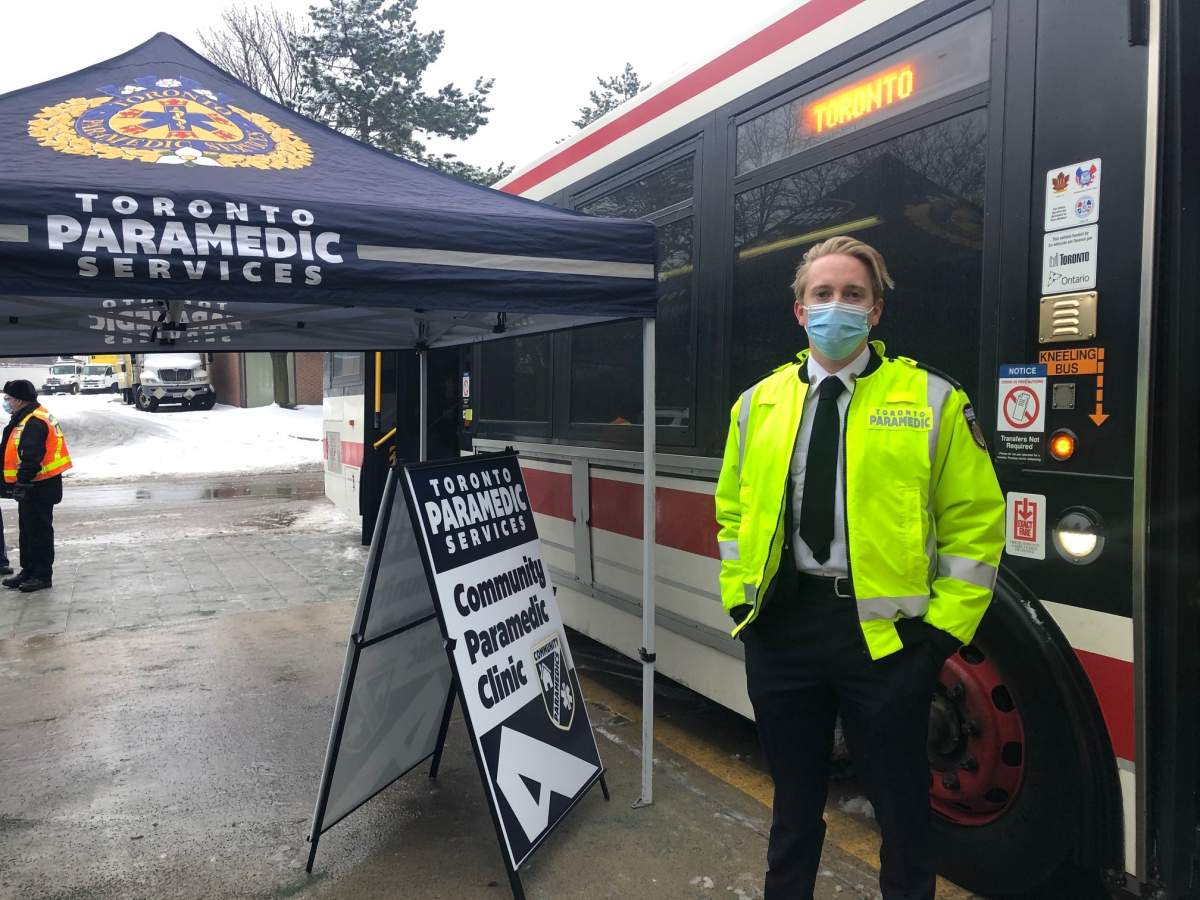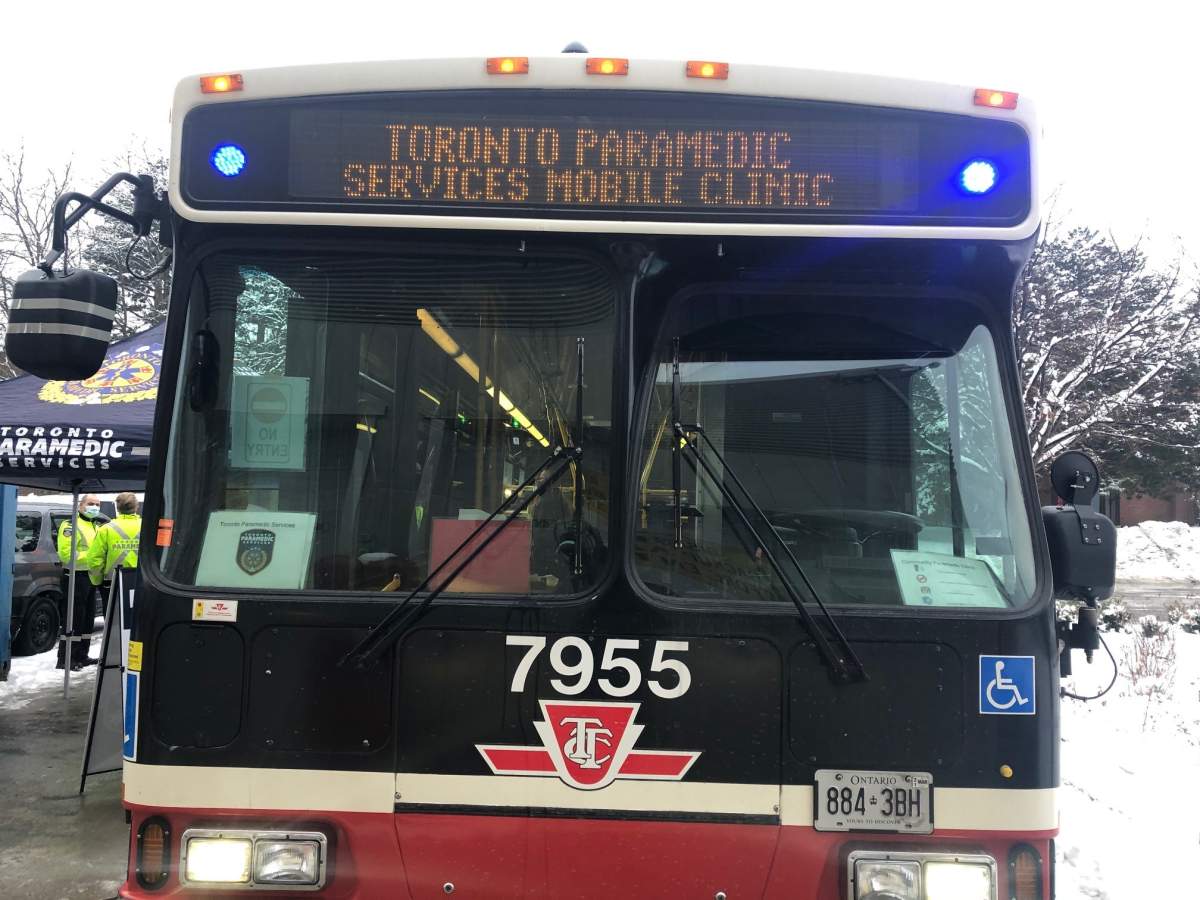Through the pandemic, it has become abundantly clear that many areas of Toronto don’t have the same access to testing as others, which is why the city is attempting a new mobile approach with buses.

The midsections of six decommissioned TTC buses have seen the seats removed and swapped with the various tools of the trade used for coronavirus testing.
After a trial run in the fall, the buses will soon be deployed to areas of the city where testing is harder to reach.
“We’ve had some testing initiatives where we tested 30-40 individuals, and we’ve had other initiatives where we’ve tested upwards of 300 in one day,” said Kyle MacCallum, a superintendent with Toronto Paramedic Services which is helping administer the testing.
“It really depends on the area we’re targeting, how hard they are hit by COVID-19 and the amount of resources that we have to pull together to support those needs,” he said.
Much like any other testing location without wheels, people will enter the bus where they will be registered and tested. Afterwards, all the high-touch areas will be cleaned and the process will continue.
When the bus is done with a location, it will be sent off for deep cleaning before it is put back into service.
“It’s really just four walls and a roof that we’re able to deploy to multiple locations,” said MacCallum, “where we can have a controlled environment for the testing to take place.”
MacCallum said the buses are able to be deployed within about one-to-two days after a request comes in for testing. Then it’s a matter of meeting up with agencies required to manage the testing.

Get weekly health news
Toronto Public Health is managing the testing in coordination with the province.
Toronto’s pandemic experience, like most other jurisdictions across the world, has seen many affected far worse than others. Those who earn less, are racialized, new Canadians, or person’s of colour, have typically been far more vulnerable than others.
The city has been struggling to improve access to testing and care for people in the city’s northeast and northwest, where some of the highest test positivity rates are.
In order to reach more people, the city has been leaning on community agencies to help build trust and access at community centres.

But with the arrival of cold weather and a lockdown, that access is being further imperiled. MacCallum said these buses will help address that issue.
“We are seeing a number of locations now where indoor space is becoming hard to find and we want to make sure that’s not a barrier to the folks that are coming through to be tested for COVID-19,” he said.
The buses, when fully deployed, will be part of the city’s new COVID-19 equity action plan. Toronto’s Board of Health will begin the process of the city adopting an approach to make sure no one slips through the cracks.
“At every step of the ladder, some people are having a harder time with this pandemic than others,” said its chair, councillor Joe Cressy.
When adopted by council, the plan will help tackle a wide range of issues from food security, safe isolation for those who are sick, and 24/7 childcare.
The city has identified an on-going struggle with people going to work with COVID-19 symptoms, because they fear for their ability to support their families with a positive COVID-19 result.
The equity action plan will help address that, said Cressy.

“Equity has to be central and embedded into our COVID response, otherwise we’re never going to protect those who need it. And otherwise we’re never going to beat this pandemic,” he said.
The trust built through community partnerships will be a key part of deploying the plan he said. Many of those suffering from the disease are new Canadians, whom Cressy said have a deep distrust of government services.
“So questions we receive; ‘if I contract COVID are you going to take my kids away? If I contract COVID am I going to have to be sent to an institution?’ These are real questions we hear on the ground,” said Cressy.
While the city is taking on many of the costs, Cressy said Toronto can’t address the situation alone. Proper income supports and paid sick leave are programs which will require policy change from provincial and federal counterparts.
So far, Cressy said the city is still waiting to hear from them.










Comments
Want to discuss? Please read our Commenting Policy first.